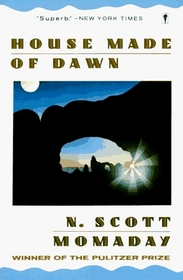Helpful Score: 4
Won a Pulitzer Prize. A wonderful, though incredibly tragic, look at what it's like for many Native Americans who endure the conflict of surviving in their own tribal cultures and in the larger (and fiercer) culture of modern America.
Helpful Score: 2
"House Made of Dawn," by N. Scott Momaday, is an extraordinary work of American literature. In this book Momaday tells the story of Abel, a Native American whose life journey takes him from the rural world of his ancestors to the harsh urban environment of an American city. Along the way Momaday creates passages of great pain, beauty, and wonder.
Consider the book's opening lines: "Dypaloh. There was a house made of dawn. It was made of pollen and of rain, and the land was very old and everlasting. There were many colors on the hills, and the plain was bright with different colored clays and sands." Prose like this gives the book a timeless, mythic flavor, and is stunningly complemented by naturalistic passages that explore such visceral topics as violence, sexual ecstasy, and alcohol abuse.
Momaday superbly evokes the people, animals, and geography of the rural West. His book also explores the significance of both oral and written cultural traditions. The book features one of the most intriguing characters in 20th century American fiction: The Rev. J.B.B. Tosameh -- "orator, physician, Priest of the Sun, son of Hummingbird" -- in whose character Momaday explores the collision between Christianity and Native American religious traditions.
"House Made of Dawn" has a somewhat fragmented structure. Like William Faulkner, Momaday expects the reader to do some work in assembling the greater story. But such work is rewarding. Recommended as companion texts: "A Son of the Forest and Other Writings," by groundbreaking Pequot Indian author William Apess; and "Mohawk Trail," by Beth Brant, a contemporary author of the Bay of Quinte Mohawk people.
Consider the book's opening lines: "Dypaloh. There was a house made of dawn. It was made of pollen and of rain, and the land was very old and everlasting. There were many colors on the hills, and the plain was bright with different colored clays and sands." Prose like this gives the book a timeless, mythic flavor, and is stunningly complemented by naturalistic passages that explore such visceral topics as violence, sexual ecstasy, and alcohol abuse.
Momaday superbly evokes the people, animals, and geography of the rural West. His book also explores the significance of both oral and written cultural traditions. The book features one of the most intriguing characters in 20th century American fiction: The Rev. J.B.B. Tosameh -- "orator, physician, Priest of the Sun, son of Hummingbird" -- in whose character Momaday explores the collision between Christianity and Native American religious traditions.
"House Made of Dawn" has a somewhat fragmented structure. Like William Faulkner, Momaday expects the reader to do some work in assembling the greater story. But such work is rewarding. Recommended as companion texts: "A Son of the Forest and Other Writings," by groundbreaking Pequot Indian author William Apess; and "Mohawk Trail," by Beth Brant, a contemporary author of the Bay of Quinte Mohawk people.
Helpful Score: 1
I found this book hard to begin, but worth the effort. Who am I to criticize the Pulitzer committee, anyway?




